17 Nov 2014 | Awards, News, Russia
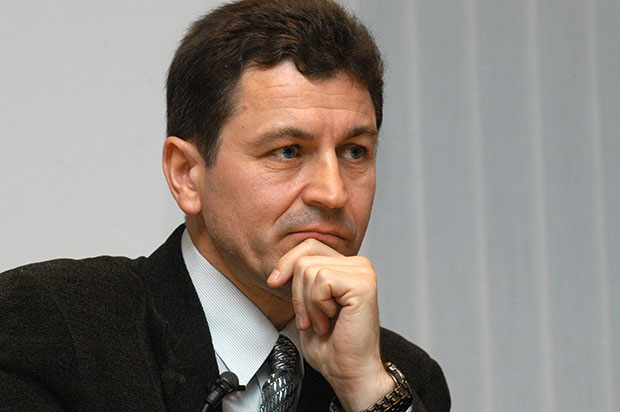
Former naval officer and journalist Grigory Pasko risked everything to uncover environmental degradation committed by the Russian Navy. (Photo: robertamsterdam.com)
In the 1990s, Grigory Pasko, a former naval officer and journalist, reported that Russia’s navy was dumping nuclear waste in the Sea of Japan (East Sea). After a series of articles exposing the environmental crimes, Russian federal security service agents arrested him in 1997, on charges of espionage and abuse of his official power. He was tried several times and eventually sentenced in December 2001 to four years of imprisonment for espionage. He was finally released in January 2003.
Pasko is one of many journalists who has been targeted by the Russian government. He says that freedom of speech and media in the country today, is not that different from when he was named International Whistleblower of the Year at the Index on Censorship Freedom of Expression Awards 13 years ago.
“It is just the same blatant rule by the security services, the same totalitarianism and lack of democratic institutions,” Pasko told Index in an email exchange.
Investigative journalists, in particular, are scarce in the current Russian environment, though the 1990 Law on the Mass Media [1991] states that journalists are allowed to carry on investigations. Article 29 of the Russian Constitution bans censorship altogether. However, under Vladimir Putin’s administration, Pasko said that press freedom and new, economically independent media have disappeared in favor of blatant propaganda.
Nominations for the 2015 Index on Censorship Freedom of Expression Awards close on 20 Nov.
Who will you nominate? A journalist? A digital activist? A campaigning organisation? An artist? Or all four?
“Investigative journalism barely exists as a genre in Russia,” Pasko said. “Journalists in our country are killed and put in prison.”
In March 2011, Pasko and his colleagues, Galina Sidorova and Igor Korolkov, established the Foundation for Investigative Journalism as a way to help professional and citizen journalists alike, as well as to create open discussion and respect for the law. It maintains “zero tolerance towards corruption in all forms”.
“Our goal is to help those who pursue this form of journalism,” Pasko said. “So far we have held schools in investigative journalism for journalists and bloggers in many towns throughout Russia. Unfortunately, funds from our sponsors limit us to holding only three such schools a year.”
Pasko said the foundation aims to teach journalists “to be free. To obey the law. To help the democratic development of journalism in Russia. To know how to use the rights they have been given by the constitution and the law. Not to be afraid.”
In a bleak time for journalists and a free media, Pasko said there is always hope for a brighter, freer future.
“The Russian public will feel a need for the truth, just as it has a need to drink fresh not stagnant water,” Pasko said. “Then society will have a need for independent free journalists. Our task and our goal meanwhile are not to let them disappear and keep the genre of investigative journalism alive.”
This article was posted on 17 Nov 2014 at indexoncensorship.org
16 Oct 2014 | News, Politics and Society, Russia
Russia’s All-Russian Memorial Society faces closure after the Justice Ministry filed a suit with the country’s Supreme Court late last month.
The Justice Ministry filed its suit on 26 September, though Russian news outlets only publicised the case last week.
Recently, Memorial, a long-time critic of the Kremlin, has tried to gain more information on political prisons and has sought justice for victims of political persecution.
Russian prosecutors first sued for Memorial to register as a “foreign agent” under a law that targets groups that receive grants from abroad. However, the court struck down this request.
The Supreme Court will hold another hearing on 13 November, according to Radio Free Europe.
Updated 31 October. An earlier version of this article incorrectly reported that the International Memorial Society, an Index on Censorship award winner, was the subject of the Kremlin action.
This article was posted on 16 October 2014 and updated on 31 October 2014 at indexoncensorship.org
12 Sep 2014 | Belarus, Europe and Central Asia, News, Russia
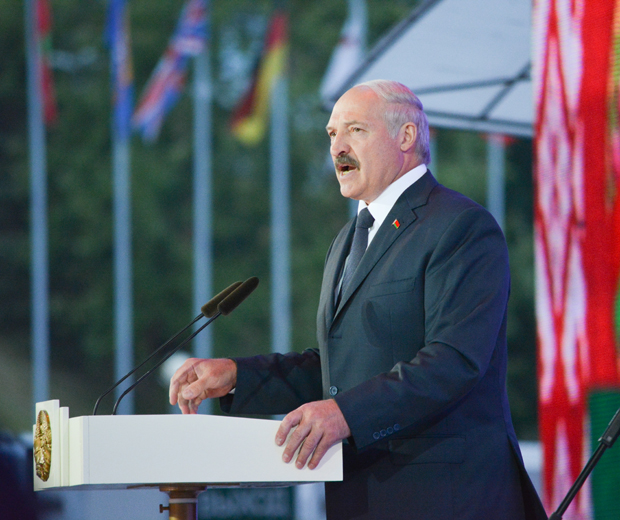
(Photo: Okras/Wikimedia Commons)
Pity poor Dmitry Dayneko. The Belarusian teen recently completed the ice-bucket challenge, as millions like him have before, and posted the video of himself being drenched in cold water on social media. So far, so hilarious/tedious (depending on your view of the challenge), but, ultimately, quite harmless.
Except apparently it wasn’t. Dmitry and the friends who poured cold water over his head say they were summoned by local authorities and given a stern warning to behave themselves, apparently on the orders of the KGB in Minsk. The reason? Not the icy water itself, but Dmitry’s temerity in nominating Belarus’ president, Alexander Lukashenko, to do the challenge next.
Lukashenko, one feels, is not a man who does lighthearted fun. One cannot imagine him posting a selfie of himself holding a cocktail with an umbrella in it, hashtagged #YOLO. One cannot even begin to think what he’d wear on fancy dress day at Bestival. He’s probably weirdly competitive at bowling. He does not do Wii.
This does not make him an exceptional dictator. In the history of autocrats, I can’t think of a single one who was mainly in it for the laughs, unless it was fun of the crushing your enemies, seeing them driven before you, and hearing the lamentations of their women variety.
In journalist Ben Judah’s recent, acclaimed essay on the court of Vladimir Putin, he describes a lonesome, rigid emotionless figure, whose only apparent joy is ice hockey, which Judah says, Putin finds “graceful and manly and fun”. This is quite normal for a man of his age and geographical situation (Lukashenko has the same love for ice hockey). But there is a difference between “fun” and “funny”; playing sport is fun. It may even be more fun if your opponents are scared of you. What it is not, though, is funny.
Because dictatorships don’t — can’t — do funny. People can make great jokes about authoritarian regimes, certainly. Ben Lewis’s Hammer And Tickle details the jokes that got people through Soviet communism between 1917 and 1989, most of which revel in the jarring, depressing juxtaposition between Soviet promises of milk and honey and everyday reality (“What is the definition of capitalism?” “The exploitation of man by man” “And what is the definition of communism?” “The exact opposite”.)
But those within the regime, within The Party, never, ever find themselves funny, which is why the generals end up with such large hats.
A couple of years ago, a viral video spread of Belarusian soldiers putting on a display on the country’s Independence Day. It was synchronised, controlled, disciplined, and one the campest things I have ever seen — the Red Army choreographed by Busby Berkeley. But this would not for one moment have occurred to anyone in charge.
Funny doesn’t work for dictatorships because funny usually involves humanity, and vulnerability. This is the appeal of the viral ice bucket challenge video: not admiring the superhuman feat of standing still while freezing water cascades over you, but laughing at the apprehension beforehand, and the hopping and shouting and screaming in the moments afterwards.
In the hands of the likes of Putin or Lukashenko and their apparatchiks, the challenge would have to become a real feat of strength and endurance: somehow Vladimir Putin would invent colder iced water than everyone else did, and then have more of it poured on him than anyone thought possible. And it would be boring because he would not flinch. And then he would not nominate anyone else, because, well, where do you go after Vladimir Putin or Alexander Lukashenko? What man could equal such a task?
Andy Warhol once pointed out that in America, an odd consumer egalitarianism existed: “You can be watching TV and see Coca-Cola,” the artist said, “and you know that the president drinks Coke, Liz Taylor drinks Coke, and just think, you can drink Coke, too. A Coke is a Coke and no amount of money can get you a better Coke than the one the bum on the corner is drinking.”
The same is true of viral phenomena like the ice bucket challenge, or the Harlem Shake before it (that meme aggravated the Azerbaijaini authorities so much that people were arrested for allegedly taking part in it). There’s no way of making throwing water over someone’s head much more than it is. The Harlem Shake effectively died when people started trying to make slicker or (shudder) sexier versions.
In spite of near-ubiquitous celebrity participation, an ice bucket challenge is an ice bucket challenge is an ice bucket challenge.
In spite of its claim to oversee a “social state” that works “for the sake of the people”, the Soviet nostalgist regime of Lukashenko cannot bear such egalitarianism.
This article was posted on 11 Sept 2014 at indexoncensorship.org
22 May 2014 | Europe and Central Asia, News, Politics and Society, Ukraine
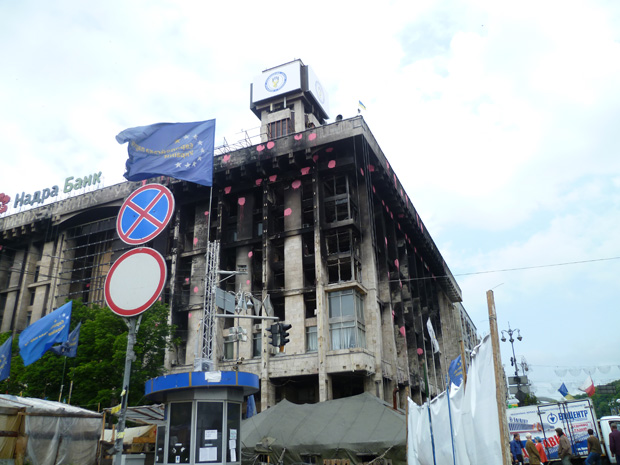
(Photo: Milana Knezevic/Index on Censorship)
Walking around Kiev’s Maidan Nezalezhnosti square, months after the protest that enveloped the city and toppled the corrupt government of Viktor Yanukovych died down, is a strange experience. International attention has understandably shifted, the images now beamed across the world are from the ongoing crisis in eastern Ukraine. The capital is calm these days, so I don’t know exactly what I was expecting as I made my way down Mykhailivska street.
Tents still populate Maidan, with young and old lounging, talking and cooking in the May sunlight. I walked past sandbag barricades, and ones made of tyres painted in the blue and yellow of the Ukrainian flag. There were flags were everywhere — EU, American, British, and many more. I walked past the independence monument, juxtaposed against the new year tree, covered by protesters in posters, and yet more flags. Music was blaring out from the small stage facing these towering structures. The lyrics I couldn’t understand, apart from the cry of “Ukraina” in the chorus. I made my way past the Maidan press centre, towards a bridge which had a large banner emblazoned with names and faces hanging from it. The Hotel Ukraina behind me, I looked out over the square.
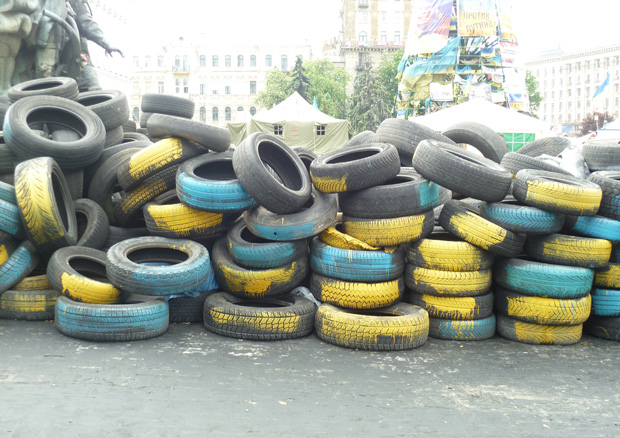
(Photo: Milana Knezevic/Index on Censorship)
The only thing missing was the crowds. It felt like they had just taken a break — gone for lunch, to return at any moment. Perhaps I arrived with a naive “out of sight, out of mind”, mentality, subconsciously assuming that the square would to an extent have been cleared out. But Maidan seems to be, for now at least, a living monument to the profound change, and crisis, Ukraine is going through.
It was against this backdrop, and with the country’s general elections set for this Sunday, I travelled to Kiev to take part in the conference Ukraine: Thinking Together. The brainchild of Yale University history professor Timothy Snyder and the New Republic’s Leon Wieseltier, its purpose was “to meet Ukrainian counterparts, demonstrate solidarity, and carry out a public discussion about the meaning of Ukrainian pluralism for the future of Europe, Russia, and the world.” The guest list included academics like Bernard-Henri, Lévy Timothy Garton Ash and Ivan Krastev, and journalists like The New York Times’ Roger Cohen and The Atlantic’s David Frum. Former Swedish prime minister Carl Bildt also made an appearance at the welcome reception.
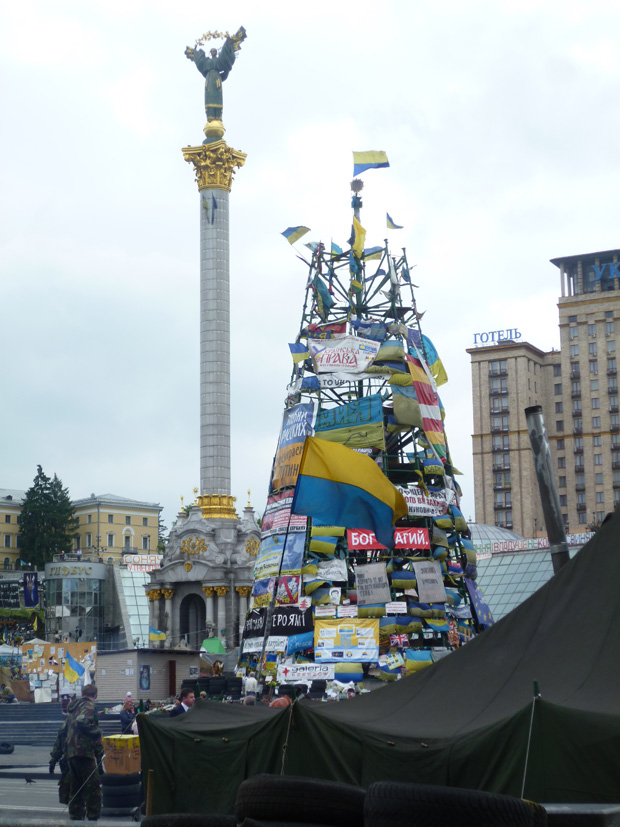
(Photo: Milana Knezevic/Index on Censorship)
One could question what, if any, effect the discussions of a group of intellectuals might have on the very real crisis on the ground. Over the weekend, there were among other things, a Crimean Tartar journalist was detained in Simferopol, while the Ukrainian military arrested two Russian reporters. But Kiev-based journalist Maxim Eristavi told me, and tweeted, that it was “surreal” to have the “intellectual powerhouse of the West in one room in Kyiv”. If nothing else, organising a big-name gathering to talk about Ukraine, in Ukraine, makes a bold statement — and one likely to be heard all the way to Moscow.
A range of topics were tackled in five days of panel debates and public lectures. The Maidan protest was applauded, with Wieseltier in his opening remarks calling it “one of the primary sites of the modern struggle for democracy”. Carl Gershman, President of the National Endowment for Democracy, called Maidan a geopolitical move, but by a people rather than a government.
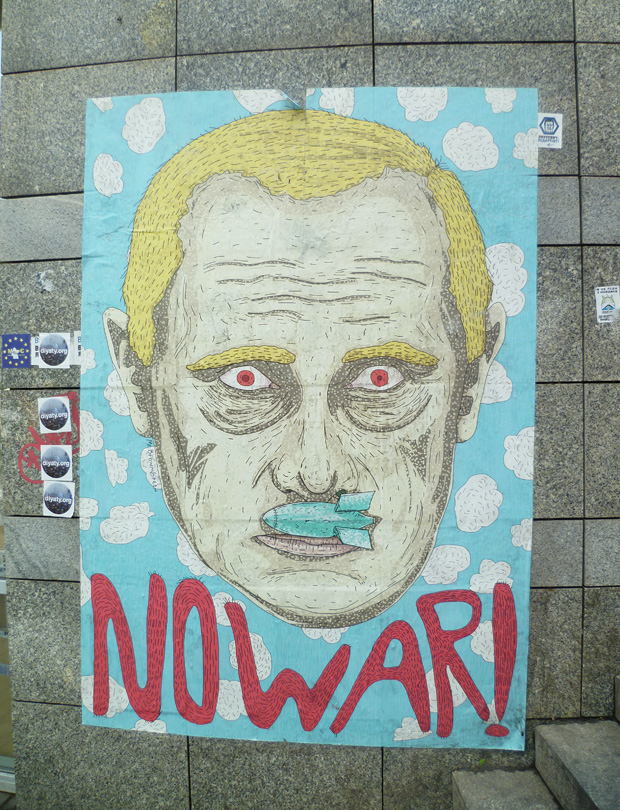
(Image: Milana Knezevic/Index on Censorship)
Bernard-Henri Lévy spoke of his recent visits to eastern Ukraine, explaining that while they might be fewer than in the Maidan, there are people in these areas who support a unified Ukraine. He contested what he believed to be the image presented in western media that people in the east are all separatists. While the point was made that flags, national symbols and the Maidan movement is not perceived as positively in all parts of the country as in Kiev, Constantin Sigov, professor at the National University of Kyiv-Mohyla, argued that the Ukrainian crisis is first and foremost civil and political, not one of identity.
Russia’s foreign policy and Russian President Vladimir Putin were unsurprisingly recurring themes. “He has values. They are not our values, but they are values,” said François Heisbourg, chairman of the International Institute for Strategic Studies, talking on the panel of geopolitics after Crimea. Writer Paul Berman argued, in the same panel, that Putin is acting from a position of weakness, and fear that Russia is not stable. Others, meanwhile, were uncomfortable with the term geopolitics, saying it legitimises Putin’s world view.
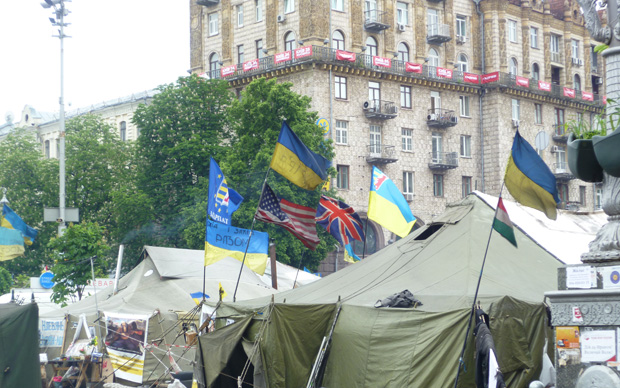
(Photo: Milana Knezevic/Index on Censorship)
Russia’s propaganda strategy was also a hot topic and elicited strong responses, with one audience member referring to it as a weapon of mass destruction. “Propaganda is the beginning of bloodshed, it precedes bloodshed,” said Alexandr Podrabinek, editor-in-chief of Prima information agency, on the panel discussing whether rights make us human. State-run news channel RT, formerly Russia Today, got several mentions. Academic Anton Shekhovtsov argued that RT gives space to democratic consensus in its coverage, but also to left-wing, far right and libertarian narratives, and even conspiracy theories. Because each is treated in roughly the same way, the democratic narrative becomes just one of many. He said this explains why RT appeals to some people in the west, but stressed that they’re pushing an overall Russian agenda.
Podrabinek, despite dubbing RT “hateful”, argued that while there might be a temptation to shut down views we don’t like, this is not a good way of confronting them. If we want freedom of expression, he said, we can’t do that. On a related note, Carl Gersham argued that while Ukraine needs to be supported economically and militarily, they also need support in modernising the media landscape, to foster internal dialogue.
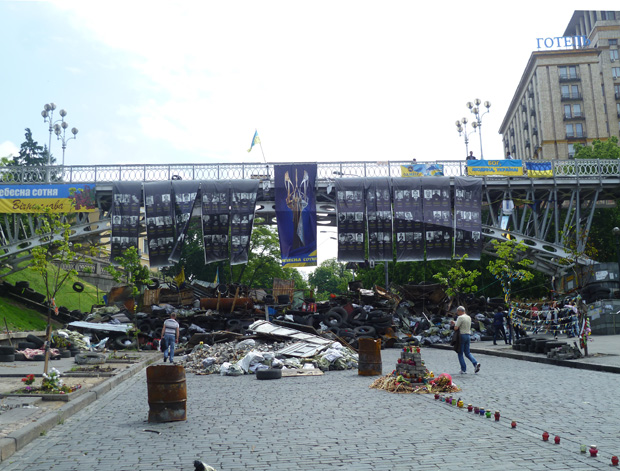
(Photo: Milana Knezevic/Index on Censorship)
And while the regime was criticised by speaker after speaker, ordinary Russians and their rights were not forgotten. Sergei Lukashevsky, director of the Sakharov Museum and Public Centre, put the support for Putin into the context of fear. When people see that the state is cracking down on human rights again, he argued, they make themselves fit in — go into survival-mode. While rights exist formally in Russia, he explained the practical situation through an old Soviet joke: “Do I have the right? Yes. Can I? No.”
In a weekend of intellectuals discussing how to solve a crisis, novelist and non-fiction writer Slavenka Drakulic gave a sobering lecture on the role of intellectuals in causing crises, specifically the Balkan wars. To be able wage war, to kill, you have to create an enemy and dehumanise it, she argued. Here is where academics, poets, journalists came in handy in former Yugoslavia — by preparing people psychologically for conflict, “using words almost like bullets”.
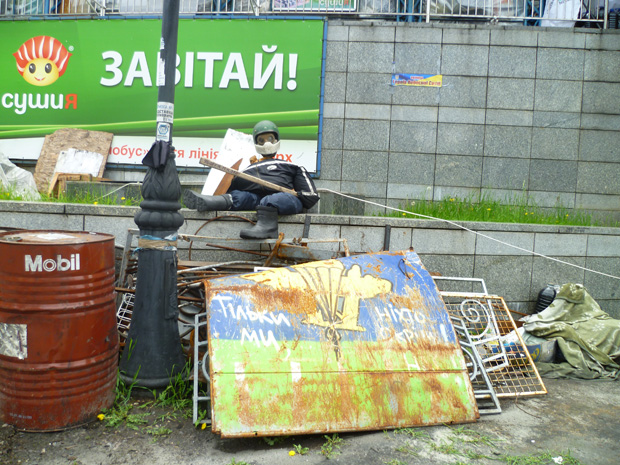
(Photo: Milana Knezevic/Index on Censorship)
And this leads well into the final panel of the conference, on the role of history and memory in politics, the difference between official history and collective and personal memories of the people, and how especially the former can be manipulated. We’re arguably seeing that today already, with Timothy Snyder saying that with events in Ukraine, a European revolution is being contested even as it’s happening. The Russian Ministry of Education is already writing new chapter to explain Crimea, said acclaimed Ukrainian novelist Andrey Kurkov. “And Ukraine might have their version.”
After my trip to Maidan, I asked a Ukraine-based AP journalist what the future might bring for the square. There are only a specific type of people still there, she explained, and they might see how the elections go before they decide to stay or leave.
Or as Myroslav Marynovych, the founder of Amnesty International Ukraine, said during the conference — when there is democracy, there will be no need to go to Maidan.
This article was published on May 22, 2014 at indexoncensorship.org









